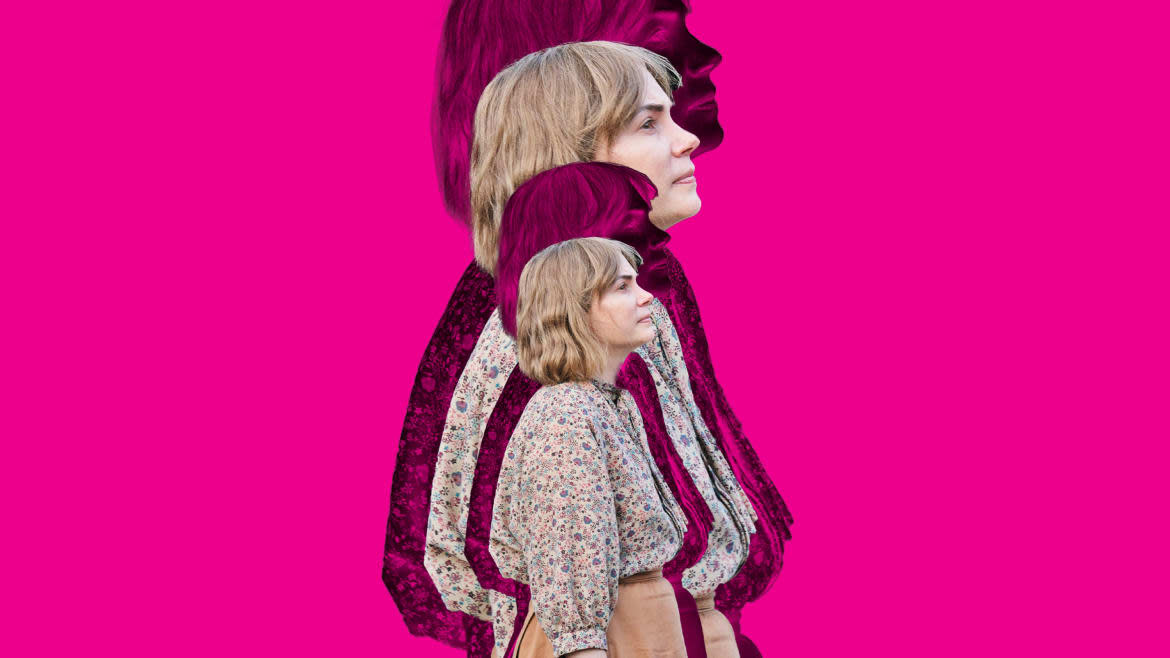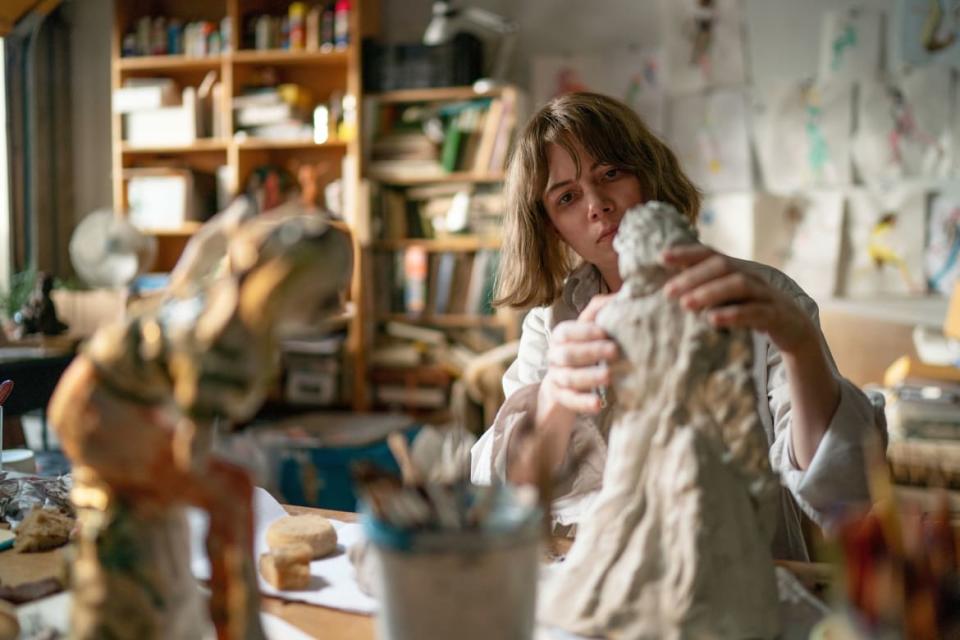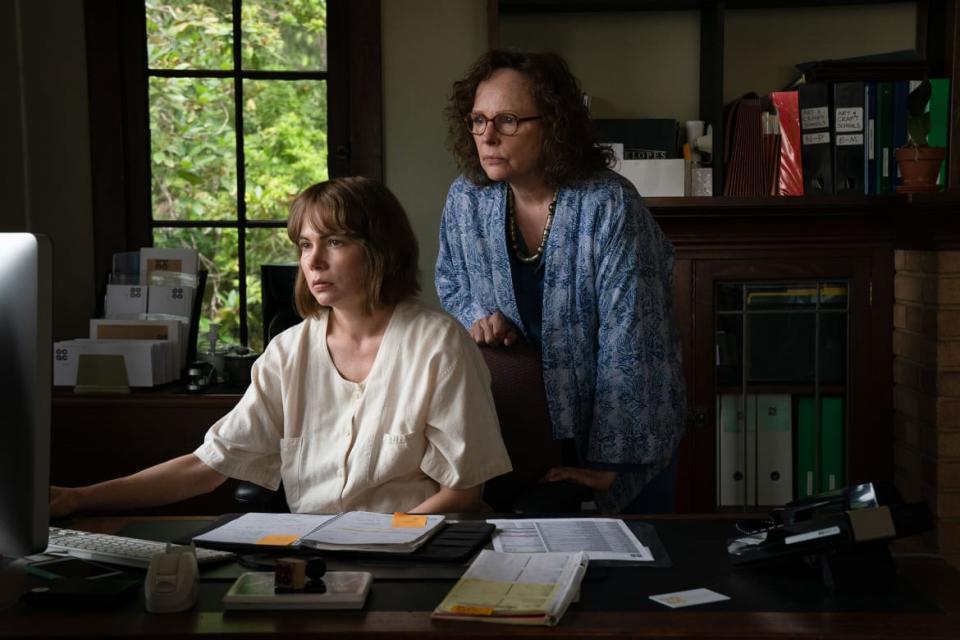In ‘Showing Up,’ Michelle Williams Brilliantly Taps Into an Artist’s Inner Hell

Being an artist is really, really hard. (No, like, actually.) That reality isn’t exactly accepted by a decent chunk of the population, who believe that pursuing the arts is a ticket to an unhappily debt-riddled existence, devoid of any mass-marketable skill. But those admonishments are an intrinsic part of why the creative life is such a uniquely difficult burden. Apart from navigating a competitive industry, an artist is doomed to face critics—not just of their work, but of their entire profession.
Director Kelly Reichardt is certainly no stranger to staring down both of these facets of her artistry. Reichardt is as acclaimed as she is divisive, with most of her films categorized as “slow cinema,” a genre defined by work that is leisurely but willfully dense. When she broke out of that reductive classifier for the 2014 thriller, Night Moves, Reichardt received praise for crafting her “most accessible film to date.” In a way, the response to Night Moves was almost an exercise in how critics and audiences approach films, always looking for similar genres or familiar themes to cling to. Reichardt’s art was understood by what it could be compared to, not for what it was.
In her latest film, the splendid Showing Up (now in theaters), Reichardt reteams with her longtime collaborator Michelle Williams to tackle the peculiar interiority of being an artist. Over the course of one chaotic week, a sculptor named Lizzy (Williams) scrambles to prepare for her latest show. Amidst an onslaught of drama with her family, friends, and day job, Lizzy has to contend with the fact that balancing her personal life with her creative one is an art in and of itself. The result is a lovely, enchantingly funny meditation on what it’s like to crave a modicum of control, while continuously hindered by how big your heart is.
Living a hippy-adjacent life that all of us have probably dreamed for ourselves at some point, Lizzy works out of her home studio in her quiet Portland apartment on a tree-lined street. It’s an idyllic existence for Lizzy, perfect for putting the finishing touches on her new series of colorful, curious sculptures. At least it would be, if she weren’t being pestered by her mischievous cat, her day job at the Oregon College of Art and Craft (where Lizzy is an alumnus), and her carefree landlord and fellow artist, Jo (Hong Chau).
Despite their close proximity, Lizzy can’t seem to grab Jo’s attention for more than a few minutes. The hot water heater in Lizzy’s apartment has already been on the fritz for weeks, and Lizzy just can’t seem to nail down an answer from Jo about when it’ll be fixed. Jo is, after all, busy preparing for not one but two shows of high-concept, multimedia pieces in esteemed Portland galleries. Being a landlord takes a back seat to being an artist, and she’s free to spend her days in the studio without having to worry about how to supplement her cash flow.

Michelle Williams plays a sculptor in Showing Up
Reichardt quietly lets Jo and Lizzy’s intrinsic differences melt into the viewer’s consciousness. A stunning tracking shot follows Jo as she jogs down the sidewalk with rope and a tire. “I’ve been searching for the perfect tire for this tree,” she tells Lizzy, as she fashions a tire swing before her eyes, all while Lizzy is simply trying to figure out when she’ll be able to take a hot shower again. A similar shot later depicts Lizzy with teenagers maneuvering around her on skateboards, softly illustrating the dichotomy between the two women. Jo’s life has allowed her to retain a childlike quality; Lizzy, on the other hand, watches as events unfold around her, with everyone else seemingly undaunted by life and work.
Williams’ slouchy, endlessly burdened Lizzy is, at times, a little too pragmatic. She can’t work with noise or distraction, a far cry from her coworkers and colleagues. Reichardt and cinematographer Chris Blauvelt cooly swerve through the halls of the campus, in and out of nude life-drawing classes and amateur light installations. Everyone else seems to be approaching their passions with big, broad strokes. Lizzy, however, observes from afar with envy. Months after Williams’ filled the screen with manic affection in The Fabelmans, Showing Up is a veritable testament that her work is even more compelling—and just as attention-worthy—when it’s gentle and studied.
Though Showing Up’s protracted narrative could fit nicely into that largely trivial classification of slow cinema, it often grabs you by the collar without trying. When Jo brings a wounded pigeon into Lizzy’s life, once again upending Lizzy’s pre-show schedule, the bird becomes an unexpectedly absorbing part of the entire film. It’s not necessarily that the bird provides major dramatic stakes, but it turns into a consistent thematic touchpoint for both Lizzy and the film’s audience. It’s also a terribly clever running joke, as viewers watch Lizzy and Jo bicker by way of a pigeon in triage, catching all of the simmering heat that the pair can’t find a way to say to each other directly.
But at the center of Showing Up is the art, particularly the way that individual artists approach their process. Jo’s art is certainly bigger, broader, and makes more of an obvious statement than Lizzy’s delicate sculpture work. But Lizzy herself is the opposite of what Jo’s work communicates. She’s more caring and nurturing—to birds, people, and her equally eccentric family of fellow artists. Williams keeps Lizzy’s heart on the flowing sleeves of her clay-stained shift dresses, empowering her with a muted autonomy that eventually comes to the forefront, as her week from hell becomes more turbulent.

Michelle Williams and Maryann Plunkett star in Kelly Reichardt’s new movie Showing Up
Jo’s carefree spirit has worked well for her, settling her nicely into a place where she can freely create without having to worry about money. Chau bears that breezy attitude in droves, making Jo just as obnoxious as she is aspirational. But to make good art—or, at the very least, interesting art, filled with personality and fascinating imperfection—the element of contentment is an enemy. Art should say something; it requires struggle and thought to do so. The biggest inconvenience in Jo’s life is her tenant’s water heater. Lizzy might not be functioning as highly, but openness allows her to let all of life’s roadblocks inspire her. She’s seen disorder and self-involvement play out throughout her entire life. And despite the deadline for her sculptures nipping at her heels, being there for everyone else remains as important as being there for herself.
As dragged-out or uneventful as that might sound to some, Showing Up is never long-winded. By its end, the film twinkles into an earnest and truly unique experience. Reichardt leaves plenty of roomy, comfortable space for viewers to stretch out and interpret each character based on their own history with creating. Through Lizzy, Reichardt tells us that being an artist should always be a little disorienting. Without the quality of the unexpected, the work won’t just lose its edge, but its heart too.
Get the Daily Beast's biggest scoops and scandals delivered right to your inbox. Sign up now.
Stay informed and gain unlimited access to the Daily Beast's unmatched reporting. Subscribe now.

 Yahoo News
Yahoo News 
